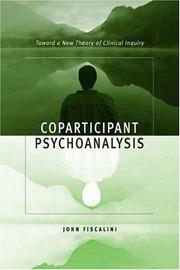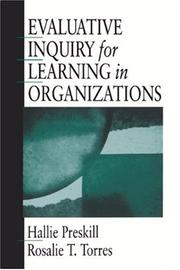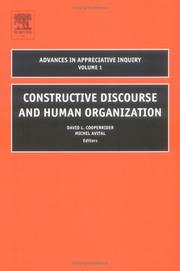| Listing 1 - 4 of 4 |
Sort by
|

ISBN: 023113262X 0231132638 0231507267 Year: 2004 Publisher: New York : Columbia University Press,
Abstract | Keywords | Export | Availability | Bookmark
 Loading...
Loading...Choose an application
- Reference Manager
- EndNote
- RefWorks (Direct export to RefWorks)
Traditionally, two clinical models have been dominant in psychoanalysis: the classical paradigm, which views the analyst as an objective mirror, and the participant-observation paradigm, which views the analyst as an intersubjective participant-observer. According to John Fiscalini, an evolutionary shift in psychoanalytic consciousness has been taking place, giving rise to coparticipant inquiry, a third paradigm that represents a dramatic shift in analytic clinical theory and that has profound clinical implications. Coparticipant inquiry integrates the individualistic focus of the classical tradition and the social focus of the participant-observer perspective. It is marked by a radical emphasis on analysts' and patients' analytic equality, emotional reciprocity, psychic symmetry, and relational mutuality. Unlike the previous two paradigms, coparticipant inquiry suggests that we are all inherently communal beings and, yet, are simultaneously innately self-fulfilling, unique individuals. The book looks closely at the therapeutic dialectics of the personal and interpersonal selves and discusses narcissism-the perversion of the self-within its clinical role as the neurosis that contextualizes all other neuroses. Thus the goal of this book is to define coparticipant inquiry; articulate its major principles; analyze its implications for a theory of the self and the treatment of narcissism; and discuss the therapeutic potential of the coparticipant field and the coparticipant nature of transference, resistance, therapeutic action, and analytic vitality. Fiscalini explores "analytic space," which marks the psychic limit of coparticipant activity; the "living through process," which, he suggests, subtends all analytic change; and "openness to singularity," which is essential to analytic vitality. Coparticipant Psychoanalysis brings crucial insights to clinical theory and practice and is an invaluable resource for psychoanalysts and therapists, as well as students and practitioners of psychology, psychiatry, and social work.
Clinical psychology. --- Psychoanalysis. --- Inquiry (Theory of knowledge)
Book
ISBN: 0892641207 0472901788 Year: 1996 Publisher: Ann Arbor : Center for Chinese Studies, University of Michigan,
Abstract | Keywords | Export | Availability | Bookmark
 Loading...
Loading...Choose an application
- Reference Manager
- EndNote
- RefWorks (Direct export to RefWorks)
Inquiry (Theory of knowledge) --- Social epistemology --- S12/0217 --- Epistemology, Social --- Knowledge, Theory of --- Social role --- Knowledge, Sociology of --- China: Philosophy and Classics--Epistemology --- China --- Civilization

ISBN: 0761904549 Year: 1999 Publisher: Thousand Oaks, Calif. Sage
Abstract | Keywords | Export | Availability | Bookmark
 Loading...
Loading...Choose an application
- Reference Manager
- EndNote
- RefWorks (Direct export to RefWorks)
Organizational learning --- Inquiry (Theory of knowledge) --- #SBIB:316.334.2A500 --- #SBIB:303H520 --- #SBIB:35H300 --- #SBIB:001.HIVA --- Knowledge, Theory of --- Learning organizations --- Learning --- Communities of practice --- Knowledge management --- Organisatiesociologie: algemeen --- Methoden sociale wetenschappen: techniek van de analyse, algemeen --- Organisatieleer: algemene werken --- Organizational learning. --- Arbeids- en organisatiepsychologie --- personeelsbeleid en -opleiding --- Inquiry (Theory of knowledge). --- personeelsbeleid en -opleiding.

ISBN: 1281015989 9786611015985 1849501599 008047232X 9781849501590 0762308923 9780080472324 9780762308927 Year: 2009 Publisher: Bingley Emerald Group Publishing Limited
Abstract | Keywords | Export | Availability | Bookmark
 Loading...
Loading...Choose an application
- Reference Manager
- EndNote
- RefWorks (Direct export to RefWorks)
Appreciative Inquiry has touched and affected the life of thousands who apply its principles in a wide range of settings including industry, government, spiritual and not-for-profit organizations. The Advances in Appreciative Inquiry series advocates an organizational science that focuses on advancing a scholarship of positive human organizations, positive relationships and positive modalities of change, which promise to be of world benefit for individuals, organizations and communities.The book series is dedicated to building such a discipline through the advancement of Appreciative Inquiry as an approach to organizational inquiry and human development, and through the interdisciplinary articulation of non-deficit theories of positive change processes in human systems. Guided by the ethos of Appreciative Inquiry, the book series supports a relentless inquiry into the true, the good, the better and the possible. It is dedicated to advancing a scholarship of the positive and positive scholarship. The book series aims to facilitate an emergent dialogue within the social sciences and to support innovative and challenging work. Setting the stage for the series, the first volume, Constructive Discourse and Human Organization, revolves around three main themes: we live in worlds our questions create, appreciative discourse and narrative, and the design of inquiring systems.
Organizational change. --- Inquiry (Theory of knowledge) --- Critical discourse analysis. --- Social change. --- Change, Social --- Cultural change --- Cultural transformation --- Societal change --- Socio-cultural change --- CDA (Critical discourse analysis) --- Change, Organizational --- Organization development --- Organizational development --- Organizational innovation --- Social history --- Social evolution --- Discourse analysis --- Knowledge, Theory of --- Management --- Organization --- Manpower planning --- Business & Economics --- Psychology --- Organizational theory & behaviour. --- Personnel management. --- Human Resources & Personnel Management. --- Applied Psychology. --- Corporations --- Employment management --- Human resource management --- Human resources management --- Manpower utilization --- Personnel administration --- Public administration --- Employees --- Employment practices liability insurance --- Supervision of employees --- Personnel management
| Listing 1 - 4 of 4 |
Sort by
|

 Search
Search Feedback
Feedback About UniCat
About UniCat  Help
Help News
News